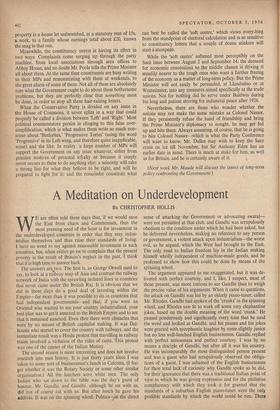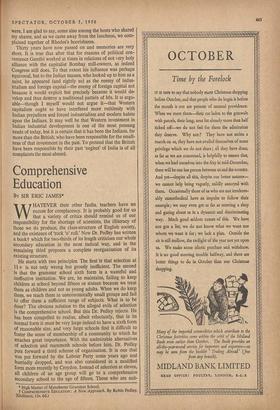A Meditation on Underdevelopment
By CHRISTOPHER HOLLIS WE are often told these days that, if we would save the East from chaos and Communism, then the most pressing need of the hour is for investment in the underdeveloped countries in order that they may indus- trialise themselves and thus raise their standards of living. I have no word to say against reasonable investment in such countries, but, when critics go on to complain that the present poverty is the result of Britain's neglect in the past, I think that it is high time to answer back. The answers are two. The first is, as George Orwell used to say, to look at a railway map of Asia and contrast the railway network of India with the sprawling isolated lines in countries that never came under the British Raj. It is obvious that we did in those days do a good deal of investing within the Empire—far more than it was possible to do in countries that had independent governments—and that, if you were an Oriental who wanted to see your country industrialised, your best plan was to geVit annexed to the British Empire and to see that it remained annexed. Even then there were obstacles that were by no means of British capitalist making. It was Dal- housie who started to cover the country with railways, and the immediate result was a Hindu protest that travelling in railway trains involved a violation of the rules of caste. This protest was one of the causes of the Indian Mutiny.
The second reason is more interesting and does not involve research into past history. It is just thirty years since I was taken to some sort of businessmen's lunch in Calcutta. (I for- get whether it was the Rotary Society or some other similar organisation.) All the lunchers were white men The only Indian who sat down to the table was the day's guest of honour. Mr. Gandhi, and Gandhi, although he sat with us, did not of course eat with us. But after lunch he gave his address. It was on the spinning wheel. Pohtics—Fin the direct sense of attacking the Government or advocating swaraj- were not permitted at that club, and Gandhi was scrupulously obedient to the condition under which he had been asked, but he delivered nevertheless, making no reference to any person or government, a violent attack upon industrialism—the worst evil, as he argued, which the West had brought to the East. The only road to Indian freedom lay in the Indian making himself wholly independent of machine-made goods, and he professed to show how this could be done by means of the spinning wheel.
The argument appeared to me exaggerated, but it was de- livered with perfect courtesy. and I, like, I suspect, most of those present, was more curious to see Gandhi tthan to weigh the precise value of his arguments. When it came to questions, the attack on Gandhi was led by an elderly piano-tuner, called Mr. Rhodes. Gandhi had spoken of the 'cranks' in the spinning wheel, and Rhodes saw fit to work off some very elephantine jokes. based on the double meaning of the word 'crank.' He paused ponderously and significantly every time that he used the word and looked at Gandhi, and his pauses and his jokes were greeted with sycophantic laughter by some slightly junior but no less well-lunched English businessmen. Gandhi replied with perfect seriousness and perfect courtesy. I was by no means a disciple of Gandhi, but after all it was his country. He was incomparably the most distinguished person present and was a guest who had scrupulously observed the obliga- tions of a guest. I was ashamed of the English businessmen for their total lack of curiosity why Gandhi spoke as he did, for their ignorance that there was a traditional Indian point of view to which he was giving expression and for the philistine complacency with which they took it for granted that the standards of a suburban English piano-tuner were the only posgible standards by which the world could be run. Thera were, I am glad to say, some also among the hosts who shared my shame, and as we came away from the luncheon, we com- plained together of Rhodes's boorishness.
Thirty years have now passed on and memories are very short. It is true that after that for reasons of political con- venience Gandhi worked at times in relations of not very holy alliance with the capitalist Bombay mill-owners, as indeed Congress still does. To that extent his influence was perhaps equivocal, but to the Indian masses, who looked up to him as a saint, he appeared (and rightly so) as the enemy of indus- trialism and foreign capital—the enemy of foreign capital not because it would exploit but precisely because it would de- velop and thus destroy a traditional pattern of life. It is argu- able—though I myself would not argue it—that Western capitalism ought to have interfered more ruthlessly with Indian prejudices and forced industrialism and modern habits upon the Indians. It may well be that Western investment in. Indian industrial development is one of the most pressing needs of today, but it is certain that it has been the Indians, far more than the British; who have been responsible for the small- ness of that investment in the past. To pretend that the British have been responsible by their past 'neglect' of India is of all complaints the most absurd.



















































 Previous page
Previous page